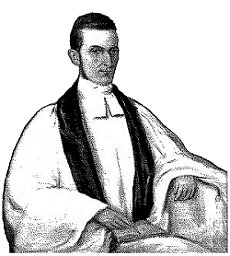

![]()
Father Benjamin Petit
Potawatomi Trail of Death
(Sept. 4, 1838 - Nov. 4, 1838)

Reverend Benjamin Marie Petit, of the City of Rennes, France, arrived as the Catholic missionary to the Potawatomi Indians in northern Indiana in November 1837. By June 1838, he had learned much of their difficult language and their culture, and had instructed and baptized many. "'We were orphans,' they said to me, 'and as if in darkness, but you appeared among us like a great light, and we live'," Father Petit wrote to his mother in France. The Indians begged their "Father Black Robe" to accompany them on their forced removal from Indiana in September 1838. His superior, Bishop Simon Brute` of Vincennes, Indiana, finally consented, in time for him to join them enroute at Danville, Illinois, ministering to their needs, both spiritual and material on their march to Kansas territory.
The Potawatomi "Trail of Death" had started at Menominee's village south of Plymouth, down the Michigan Road (Old Highway 31), through Rochester on Main Street, through Logansport, and along the north side of the Wabash River to cross into Illinois at Danville. He baptized the dying children, among them newly born "who with their first step passed from earthly exile to the heavenly sojourn," according to one of his letters, which were published by the Indiana Historical Society in 1941.
In them he vividly describes the hardships and the anguish of "my poor Christians, under a burning noonday sun, amidst clouds of dust, marching in line, surrounded by soldiers who were hurrying their steps" and the heartbreak of the Indians as they buried their loved ones and marched on. Across the great prairies of Illinois they marched, crossed the Mississippi River at Quincy, and then made their way through Missouri to enter Kansas territory south of Independence, Missouri. About 40 Indians died on the march, mostly children. Father Petit blessed each grave. He was himself at times sick with fever.
After placing the Potawatomi in the spiritual hands of Jesuit Father Christian Hoecken at the Sugar Creek Mission in Kansas on November 4, 1838, Father Petit again fell sick with fever and painful open sores. On January 2, he started by horseback back to Indiana, accompanied by Abram Burnett (Nan-Wesh-Mah), a full-blood Potawatomi friend, but again was taken ill. With three open sores draining his strength, he rode from Jefferson City in an open wagon, the roads rough and rain frequent. He reached the Jesuit seminary at St. Louis University on January 15. The fathers gave him all the medical attention and care they could, but he grew weaker and weaker. Father John A. Elet, then rector-president of St. Louis University, later wrote that he placed a crucifix to Father Petit's dying lips and twice he kissed it tenderly. He lay on agony and finally expired 20 minutes before midnight, February 10, 1839, a martyr to his duty and his extraordinary devotion and love for his Potawatomi family. He had lived but 27 years and 10 months.
Father Petit died in the Jesuit seminary building at 9th and Washington Streets and was buried in the old cemetery at 7th Street and St. Charles Avenue. In 1856 the cemetery was moved to make way for downtown St. Louis. At that time, Father Edward Sorin, founder of Notre Dame University, South Bend, Indiana, came and took Father Petit's body back to Indiana. Father Petit's remains rest under the Log Chapel at the University of Notre Dame.
"In the name of the Father, and of the Son and of the Holy Ghost. If it should please God to send me death, I accept it in all love and submission to his amiable Providence and I hope that his mercy will have pity on me at the last moment. I commend myself to Mary now and at the hour of my death."
~From Father Petit's will, written August 17, 1837, at Vincennes, Indiana.~